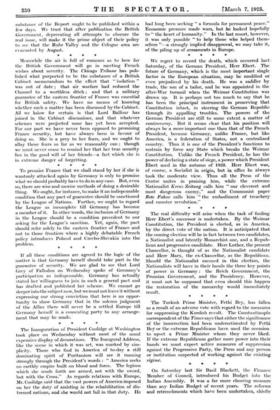* * * * We regret to record the death,
which occurred last Saturday, of the German President, Herr Ebert. The future of Germany, which is the most important single factor in the European situation, may be modified or even prejudiced by his death. He was a saddler by trade, the son of a tailor, and he was appointed in the after-War turmoil when the Weimar Constitution was drawn up. It is perhaps not too much to say that he has been the principal instrument in preserving that Constitution intact, in steering the German Republic through its appalling troubles. The powers of the German President are still to some extent a matter of controversy.. But it seems clear that his position will always be a more important one than that of the French President, because Germany, unlike France, but like America, is a federation of States, not a centralized country. Thus it is one of the President's functions to restrain by force any State which breaks the Weimar Constitution. Unlike the French President, he has the power of declaring a state of siege, a power which President Ebert used in the autumn of 1923. Herr Ebert was, of course, a Socialist in origin, but in office he always took the moderate view. Thus all the Press of the Centre unites in praising him, while the extreme Nationalist Kreuz Zeitung calls him " our cleverest and most dangerous enemy," and the Communist paper Rote Fahne calls him " the embodiment of treachery and counter revolution."


























































 Previous page
Previous page